Did you know the majority of successful CEOs wake up early? In fact, according to INC magazine, nearly two-thirds of CEOs at fast-growing companies wake up by 6 a.m., and almost 90% wake up by 7 a.m!
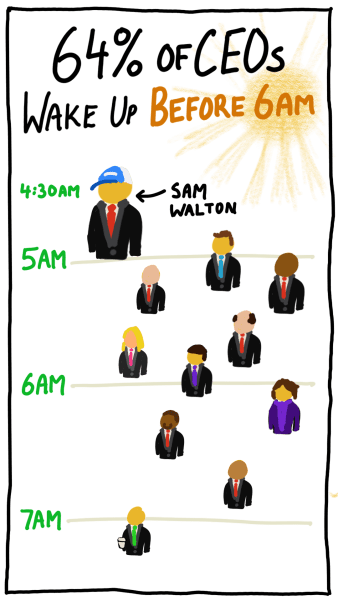
This strongly suggests that waking up early could be a key factor in productivity and leadership. So if you want to improve in those areas, then maybe the single best thing you could do is set your morning alarm earlier.
One of my favourite business leaders of all time was Sam Walton. He grew Walmart from one small-town store into a massive retail empire with thousands of locations.
How did Sam do it? Well, here’s one important factor: he began every workday before everyone else at a bright and early 4:30 a.m.! Sam Walton’s autobiography says, “That early morning time is tremendously valuable: it’s uninterrupted time when I think and plan and sort things out.”
I recently began waking up earlier, now staring each workday around 6 a.m. And I can’t express what a positive difference this practice makes in helping me begin each day with more focus and self-discipline. Usually I’ll start the day with some green tea and reading, and a couple hours later have coffee and breakfast.
What’s the point of waking up early? To have some distraction-free time to work on yourself before you have to go to work for others.
About the Author
Robin Sharma is a bestselling author, popular speaker and trainer. His books have sold millions of copies, including the classic “The Monk Who Sold His Ferrari.” He has personally trained many top-level leaders like CEOs and companies like Nike, Microsoft and Fedex.
🌅 1. Wake Up at 5AM: Starting the day earlier gives us distraction-free time to do high-value work in a flow state
The 5AM Club is all about waking up early, saying this is the secret to productivity. This book is actually written as a story—with characters who go on a bizarre adventure. Keep in mind this is not a true story, but the characters do have relatable personal struggles, like feeling too afraid and distracted to achieve their dreams.
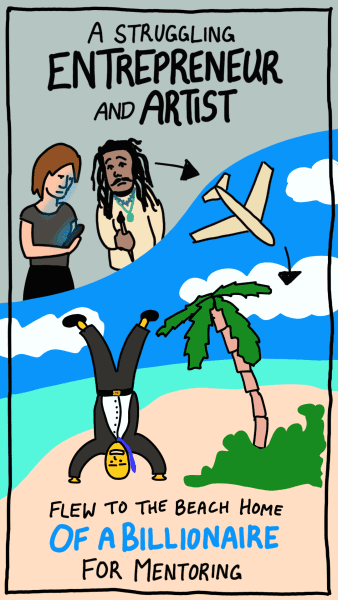
Here are the four main characters:
- The Entrepreneur. A thin woman with short brown hair. She has grown a successful startup, but is now in danger of losing her company to hostile investors. She was considering suicide when she stumbled on a ticket to a self-help seminar.
- The Artist. A painter with a goatee and dreadlocks that struggles with procrastination, also at the seminar.
- The Spellbinder. The world-renowned speaker at the self-help seminar. He is a tall thin man in his 80’s. Suddenly he collapses onstage, and the audience is unsure if he died.
- The Billionaire. A man named Stone Riley, who built a business empire. He’s a very quirky character, doing spontaneous handstands mid-conversation.
At the self-help seminar, the Entrepreneur and the Artist begin talking about how the speaker just collapsed in front of them. They are suddenly interrupted by a man who appears to be homeless because he is dressed poorly. The man claims to have built a business empire. He invites the two main characters for mentoring at his private island. They don’t know if this ‘homeless’ man is telling the truth, but they decide to take a leap of faith and say yes.
The next day, a private plane takes the Entrepreneur and Artist to the island nation of Mauritius. Then a black SUV drives them to a beautiful beach home.
The SUV driver explains the homeless man is actually a billionaire named Stone Riley, but he likes to dress poorly as an exercise from Stoic philosophy. It helps the billionaire to detach his happiness from material possessions and social status, which are always fleeting.
They are also stunned to find the Spellbinder tanning on the beach, who explains he collapsed on stage because of too many presentations in a row.
The next morning at 5 a.m., the lessons begin from the billionaire. Stone Riley tells his story: he was a 33-year-old entrepreneur looking to build his company to world-class. He heard The Spellbinder was the greatest coach in the world, so he began learning under him and eventually built an enormous empire.
The most important lesson for the Billionaire was waking up early at 5 a.m. That was the keystone habit that set up each day for success.
The quiet early morning time before the world’s distractions allowed him to work on his single most important task, and often enter a flow state like great athletes do. So this becomes the core teaching of the book as the Billionaire invites the Entrepreneur and Artist to join a club of elite performance called The 5AM Club.
Let’s talk more about that idea of working first on our single most important task. Most great productivity books talk about the importance of priorities. Like the legendary author Stephen Covey wrote whole books about “putting first things first.”
In the more recent book The 4-Hour Workweek, author Tim Ferris explains the importance of the 80/20 Rule for our success. You’ve probably heard of this before, but just in case you haven’t—the 80/20 Rule says that in almost any area, 80% of our results will come from 20% of our efforts.
So in the earliest morning hours, it makes sense that we should focus our efforts on the 20% of our work that is most important or valuable, which usually also means most difficult. That requires delaying checking the news, sports, social media, and even email.
An Entrepreneur is struggling with hostile investors trying to take over her company. She seeks hope at a self-help seminar, where she meets a procrastinating Artist and a Billionaire dressed as a homeless person. The Billionaire invites them for private mentoring at his beachfront home, where they begin learning the value of waking up at 5 a.m.
✅ 2. Execute a Morning Routine: The 20/20/20 Formula gets our day started on the right track—physically, mentally, and spiritually
You’ve probably heard about creating a morning routine before. The 5AM Club offers a convenient template we can follow to design the first hour of our morning routine—it’s called The 20/20/20 Formula:
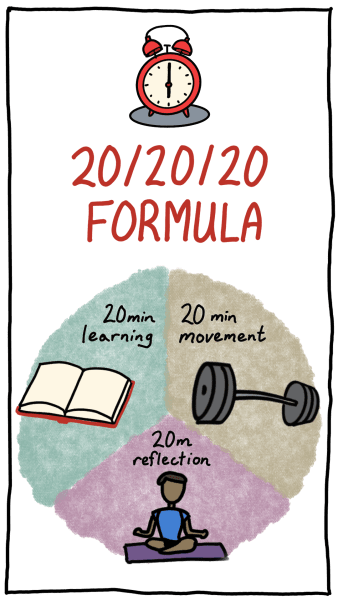
- 20 minutes of physical movement. Such as running, lifting weights, or intense yoga. Not only does exercise make us live healthier and longer, but there are important benefits helping us feel better and learn better through brain chemicals like serotonin, cortisol, and BDNF (brain-derived neurotrophic factor).
According to this book by Robin Sharma, it’s very important that we exercise hard enough to sweat to get the benefits of physical activity. But is that true? Let’s double check. In the book Lifespan by David Sinclair, a Harvard Professor specializing in aging, he agrees that a moderate amount of biological stress provides great benefits helping us live longer. That kind of positive stress can come in the form of strenuous exercise, fasting, or exposure to cold temperatures. - 20 minutes of spiritual reflection. Such as journalling, praying, or simply sitting in silence. You can even visualize your ideal self or where you want to be in 10 years. Whatever works for you, really. This is a moment to feel peace and thankfulness before the noise of the day arrives. We can also release our frustrations and whatever is on our mind, by writing them down.
- 20 minutes of learning and growth. We can read a book, listen to an audiobook or podcast. (Or maybe read a book summary every day!) The idea is to become a little more valuable every day, so we can better serve other people and compete in the marketplace.
By now, I’m sure we all know how important habits are to productivity. It’s not a new idea. Heck, a hundred years ago the philosopher Will Durant summed it up beautifully, “We are what we repeatedly do. Excellence, then, is not an act, but a habit.”
But there is a newer idea of “systems vs goals” that I want to share with you. It takes the concept of habits a few steps further, by emphasizing the importance of creating a set of processes or practices that can lead to success, rather than just focusing on specific end results or outcomes.
This concept of systems for personal productivity was popularized by self-help authors such as James Clear, who wrote the book “Atomic Habits,” and Scott Adams, the creator of the “Dilbert” comic strip and author of “How to Fail at Almost Everything and Still Win Big.”
By focusing on our systems (our daily routines, habits and protocols), we can build momentum over time, rather than relying on sporadic bursts of motivation or willpower.
For example, someone who wants to write a book would be more likely to succeed by creating a daily habit of writing 300 words per day, rather than focusing on their big intimidating goal which will likely cause procrastination.
Perhaps the most important system we can have is a well-crafted morning routine, because that sets the tone for the rest of our day. This principle is also supported by Admiral William H. McRaven, wrote a book called Make Your Bed on the life lessons he learned as a Navy SEAL.
In that book, McRaven’s first piece of advice for cultivating self discipline is to “start each day with a task completed.” He suggests making your bed every morning, as soon as you wake up. Tiny habits like this can begin a “snowball effect” of improvement in our lives. Just like a small snowball rolled from the top of a hill may continue growing bigger and bigger on its own on the way to the bottom.
Read more in Make Your Bed by Admiral William H. McCraven
Most people read the 5AM Club to learn how to improve their self-discipline, productivity, and leadership. For that reason, this book summary will not dive too deeply into the story. That being said, here’s a quick update on what’s happening with the Entrepreneur and Artist. They are learning these lessons while enjoying their time on the beach and swimming with dolphins in the clear waters off the island. They seem to be falling in love because they are holding hands. Suddenly the Entrepreneur receives a terrible text message that contains a death threat from the hostile investors at her company. She is shaking with fear, and the Billionaire alerts his security team.
A carefully crafted morning routine is key to self-discipline. Robin Sharma suggests starting the day with 20 minutes of sweaty physical activity, 20 minutes of inner reflection, and 20 minutes of learning. This routine helps set a positive tone for the rest of the day.
🏃 3. Mastery Requires Obsession: Focus on one long-term master project, and focus on never-ending 1% daily improvement
What did all great geniuses like Einstein, Darwin and Edison have in common?
Obsessive focus in one direction, for decades.
Einstein famously said, “It’s not that I’m so smart, it’s just that I stay with problems longer.” To create his theory of evolution, Darwin spent 8 full years studying sea barnacles. And Edison was perhaps the biggest fail-er of all, with each of his brilliant inventions like the lightbulb being preceded by hundreds of attempts that didn’t work.
In the 5AM Club, the Billionaire calls it a mindset of “granularity.” If we want to make the greatest impact, then we must create work or art with a level attention to detail that will seem crazy to 99% of people.
There are two main ways we can use obsession towards mastery:
- Focus on one big project. Many of us spread our efforts over many different things. But to make the greatest impact, the Billionaire says we’d be better off spending months or years perfecting one masterpiece. Stake our personal reputation on the quality of this one thing, whether it’s a painting, a book, a documentary, or a business.
The actionable tip: The 90/90/1 Rule. For the next 90 days, work for 90 minutes on your 1 most important project, before working on anything else.
(This reminds me of a real-life story I heard, where Bill Gates and Warren Buffett were in the same room. They were asked to write down the biggest reason for their success in one word, and they both wrote down “focus.” Gates focused on software, Buffett on investments.) - Focus on slight daily improvements. The idea of mastery requiring 10,000 hours of practice is mentioned. It is simply easier to become world class by improving a little bit every day, rather than trying to make large leaps. Getting just 1% better every day means becoming 365% better in one year, which is a major competitive advantage.
The actionable tip: Set 5 small daily targets. Having small daily milestones helps us to avoid being intimidated by our huge master project, which reduces the chance of procrastination.
(I believe this technique comes from the legendary productivity consultant Ivy Lee, who worked for men like John D. Rockefeller who may have been the richest man ever. “The Ivy Lee Method” was to have each employee write down their 6 most important tasks for tomorrow, in order of importance. The next day, they would get to work on those tasks in order. Simple, yet highly effective.)
Steve Jobs was famously obsessed with his work. His intense perfectionism led to category-defining products like the iPod and iPhone. He would have tiny details like app icons redesigned over and over again. However, that led to a management style that was highly demanding and controversial, as he pushed employees to do the impossible.
Most great people are obsessed towards one thing for decades. That “granular” focus is how they became world-class. So pick one big project you’ll work on for the next 90 days. Then set 5 small daily milestones, to help remain motivated.
🧠 4. Save Your Willpower: Why the key to self-discipline is understanding the natural limitations of our mind and body
What if self-discipline was not a fixed personality trait, but instead a type of inner battery? We all wake up with a certain amount of charge, and throughout the day our willpower gets depleted. By the end of the day, we’re exhausted and can’t help opening that bottle of whisky or bag of Doritos.
The good news is, research has shown that we can learn strategies to conserve our limited willpower and even grow our self-control! (Recently a couple of great books were written on this topic, the new science of willpower, by the psychologists Roy Baumeister at Florida State University and Kelly McGonigal at Stanford.)
Here are 4 willpower strategies the Billionaire shares on the beach:
- Simplify your life by reducing decisions. Making a decision requires a lot of brainpower, which depletes our willpower. Psychologists call this “decision fatigue.” The solution is to reduce how many decisions we must make daily. For example, Steve Jobs famously wore the same outfit every day, a black turtleneck. That may seem unusual, but it meant one less decision to make daily.
- Expect new habits to get easier over time. Research from the University College London found that the first 22 days of a new habit are the most challenging. This is because we have to use a lot of willpower to change our behavior. That’s why it can be tough to wake up at 5 a.m. at first. However, after about 66 days, the habit becomes automatic and we start to find it easier and even enjoyable to wake up early.
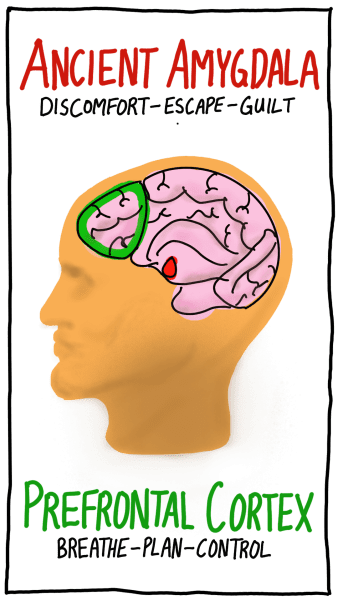
- Relax to unlock more self-control. When we try to adopt a new, difficult habit, our “Ancient Brain” may sound the alarm and cause us to feel uncomfortable. Then we often seek to escape through pleasure or distractions, then later we feel guilty.
However, we can also access our “Mastery Brain” by entering a state of flow in the morning or through meditation, which can increase our “alpha brain waves” and help us achieve a state of relaxed focus.
Now, these “brains” are not just make-believe. The scientific names for them are the amygdala and the prefrontal cortex…
What I learned from Stanford researcher Robert Sapolsky, is that the amygdala is the most ancient and primitive part of our brain. It is responsible for our fight or flight response and feelings of anxiety or aggression.
On the other hand, the prefrontal cortex is a very new part of our brain, at least on the timescale of evolution. It allows us to think logically, solve problems, and control our impulses. Sapolsky wrote, “The frontal cortex makes you do the harder thing when it’s the right thing to do.”
You can learn more about the science of human brains in our summary of his book Behave.
- Grow your willpower like a muscle. By continuing past discomfort, we can grow our ability for self-control. This is related to a scientific discovery called neuroplasticity, where repeated experiences cause connections in our brain to grow stronger. For example, I read recently that a study by the British Medical Journal found exercising improves people’s impulse control in many other areas of life.
David Goggins is an inspirational man for many people. He started life with the disadvantages of abuse and racism, then he became 100 pounds overweight and stuck in a job he hated as a cockroach exterminator… but later he transformed into a Navy SEAL, ultramarathon runner, and world record holder for doing 4,030 pull-ups in 17 hours. Not to mention a bestselling author and inspiration speaker who has spoken in front of hundreds of thousands.
How did he do it? The key, Goggins wrote, was “I brainwashed myself into craving discomfort.” Every time he wanted to give up while running or studying, he would push 5% further past his old limits. In this way, he gradually toughened his mind, unlocking his true potential. For me, it’s a case study of how one man was able to grow those willpower muscled in his brain.
Learn more in our summary of Can’t Hurt Me by David Goggins.
Self-discipline can be improved by reducing daily decision-making, building automatic habits, and relaxing to allow the prefrontal cortex to take control. Willpower can also be increased by gradually pushing past discomfort, 5% beyond our old limit.
🏖️ 5. Cycle Work and Rest: How to take more breaks and vacations, without losing productivity
Let’s return to the story for a minute. The Billionaire brings the Entrepreneur and the Artist to Rome, where they visit the catacombs, which are a vast network of underground tombs.
In this underground cemetery, the couple was taught to remember death. This is a practice from the ancient Roman philosophy of Stoicism. By remembering that we are all going to die someday, we put our current problems into perspective, which helps us overcome fear of what other people think of us. The Billionaire coughs strangely and takes some pills, both strong hints that he is seriously ill or dying.
I want to connect this to one of best books I’ve ever read: Meditations by Marcus Aurelius. He was actually a Roman emperor, the most powerful man in the world, and today he’s known as the #1 Stoic philosopher. This book is actually a collection of private journal entries that Marcus wrote to himself, coaching himself to be more self-disciplined, more emotionally stable, and—yes—to remember death more often.
Marcus Aurelius wrote to himself “You could leave life right now. Let that determine what you do and say and think.” and he even said “Soon you’ll be ashes, or bones.” Remembering the fact that life is short helps us to live in a way that will minimize our future regrets.
Next our characters in The 5AM Club visit Brazil, where the Entrepreneur and Artist are getting married! Suddenly, the artist is kidnapped by armed attackers sent by those hostile investors. Having overcome limitations of fear, the Entrepreneur runs after the attackers and faces them down, saving her soon-to-be husband. The Billionaire says he will buy out the investors, putting an end to the danger once and for all.
The final lesson our characters receive is about oscillating work and rest. They fly to South Africa, where they stay in a vineyard, riding bicycles into a beautiful sunset. In the final scene of the book, they visit a small island with a prison where Nelson Mandela spent 18 years in a tiny room. Mandela is used as a model for how we can inspire others with our lives, due to his dedication to forgiveness and service. Jumping forward five years later, the Billionaire Stone Riley had died, but the Entrepreneur and Artist were highly successful and happy, with a young son named Stone.
Here are some important ways we can rest for greater productivity:
- The 60/10 method. Work intensely for 60 minutes, then take a break for 10 minutes. Repeat for the whole work day. (This is actually a variation of the popular Pomodoro technique. You can actually choose whatever time blocks work best for you, whether it’s working for 30 minutes or 90 minutes at a time. The important thing is learning that taking regular short breaks can help us work or study better during the rest of the day.)
- No-device days. The billionaire spends 2 days per week disconnected from all devices. With so much more of our work and lives taking place online today, one of the best ways to refresh ourselves is through digital disconnection. Of course, we’ll need to find activities to fill those hours, whether that is spending time with family, learning golf, or a fun painting.
- Sleep at least 7.5 hours per night. In The 5AM Club, they discuss many scientific benefits of sleep, including improving our mood. That means we need a nighttime ritual to wind down before sleep, such as relaxing activities at 8 p.m.—relaxing with loved ones, taking a bath, reading a novel.
In The 7 Habits of Highly Effective People, one of the most important ideas is the P/PC Balance. That means having a balance between our Production, while at the same time taking care of our Production Capability.
This is best illustrated by an old children’s fable. One day a farmer found a goose that could lay golden eggs. He became greedy and killed the goose, thinking he would get all the eggs from inside it at once. In the end, he found no golden eggs inside, and he also lost the goose.
The moral of the story is that we need to take care of the goose to continue receiving the golden eggs. We need to take care of ourselves through rest if we want sustained productivity. We need to take care of our employees if we want their best work. We need to invest time in our family and friends if we want the golden egg of a great relationship.
Read more in our summary of The 7 Habits of Highly Effective People
In Rome, the couple learns the value of remembering death. In South Africa, they learn the importance of rest for optimizing productivity. It’s recommended to take breaks every 30-90 minutes of work and have at least one day off per week without digital devices.Also, get at least 7.5 hours of sleep each night.
- Consider waking up 1 hour earlier for 30 days. Remember that any new habit feels very difficult for the first 22 days, then gradually becomes easier. After 66 days, what used to feel bad can feel easy and automatic. So if we’re going to try waking up earlier, it’s better to make it a longer experiment of 30 days. (Or even better 66 days!)
One hack that really helped me wake up earlier was to put my phone on the other side of the room. This helps me get to sleep faster, because I can’t reach it. And the next morning, I have to walk across the room to turn off my phone alarm. Because I’m already on my feet, I never hit the snooze button or lay back down. - Write down a 1 hour morning ritual that would make you feel amazing. Remember, Robin Sharma recommends we do 20 minutes on movement, 20 minutes reflection, 20 minutes learning. You already have the best ideas of what makes you feel great, so brainstorm an ideal plan for your first hour. My own ideal morning routine would include some mindfulness, writing, reading, and some basic exercises with weights.
- Write down the 5 things you’ll work on tomorrow, in order of importance. Making a little plan the day before helps us to avoid distraction and procrastination. You decide today what is most important, then execute your plan tomorrow. This may sound simple, but it’s so important for controlling our impulsive temptations. Especially if we’re working on our own business or creative projects, where there is no boss to hold us accountable.

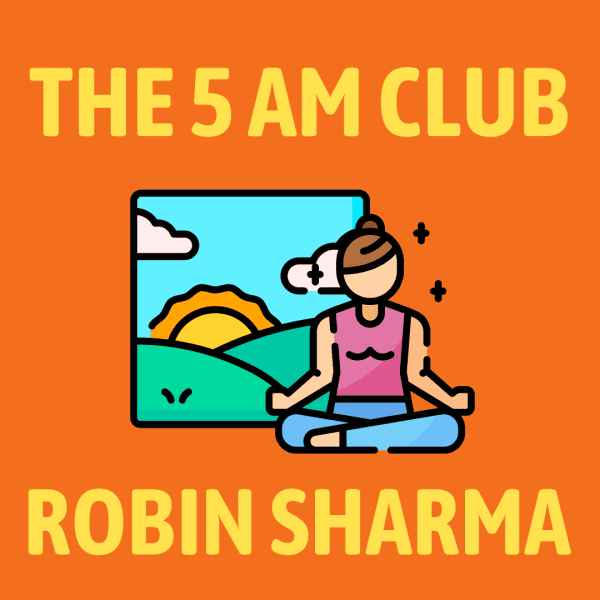





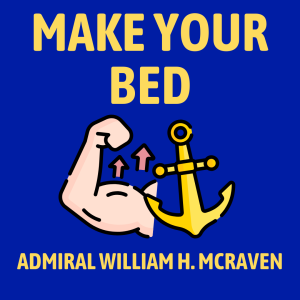
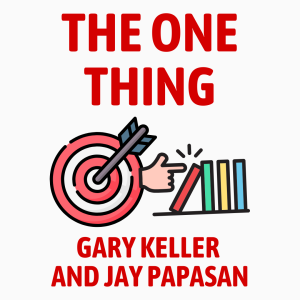
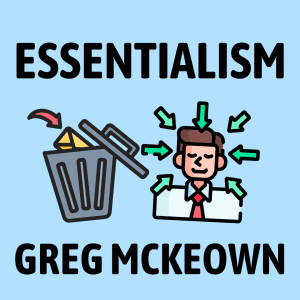




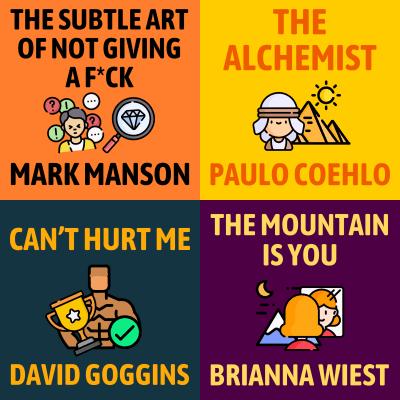


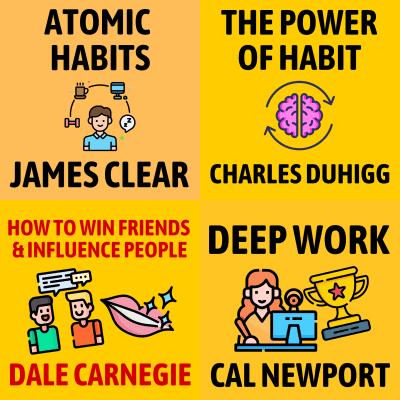


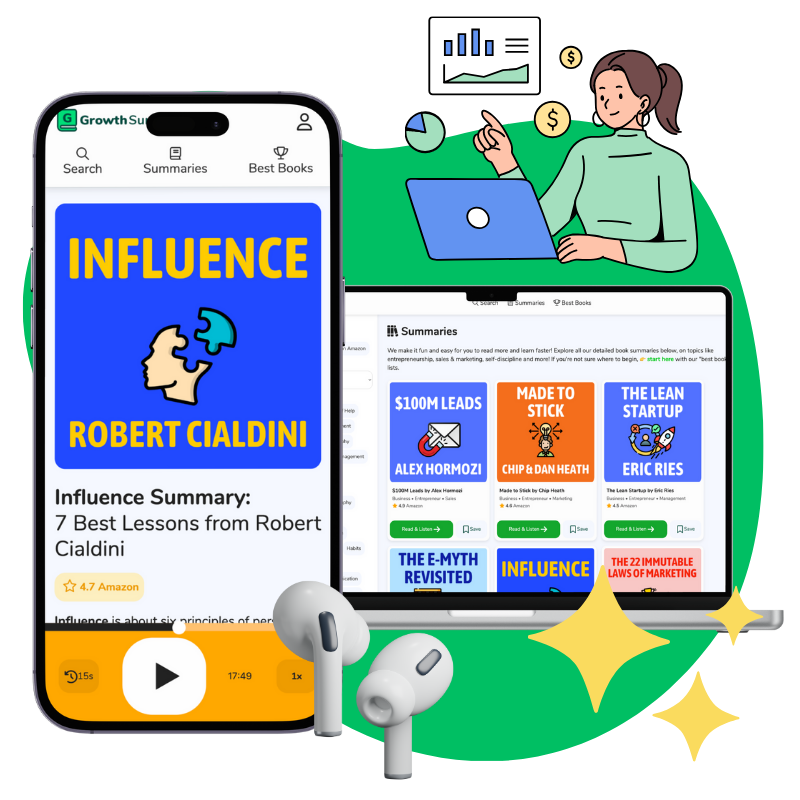
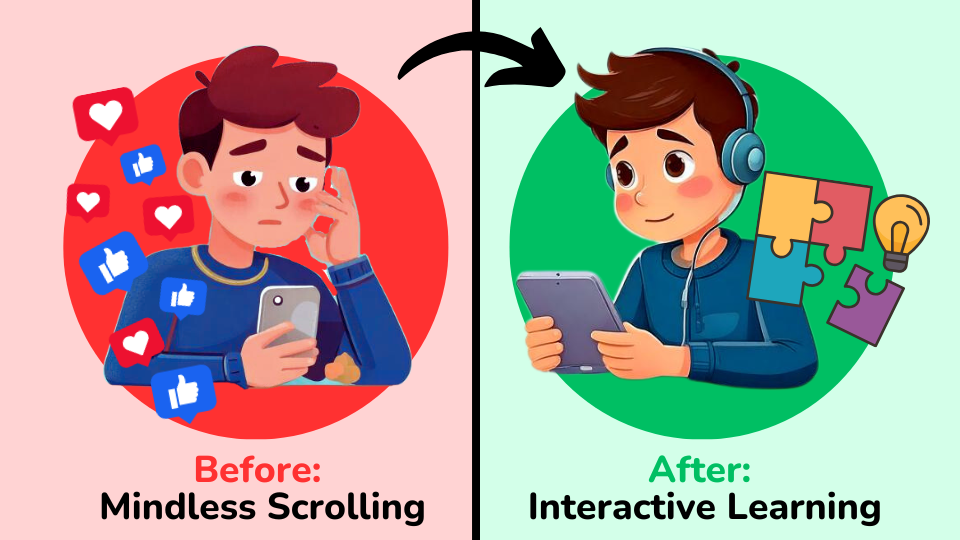








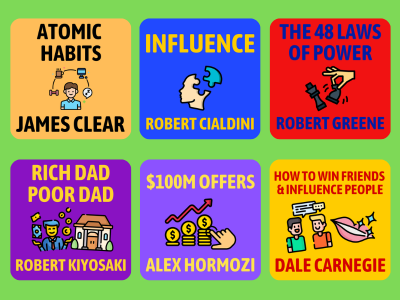
Loved this summary. Thank you.